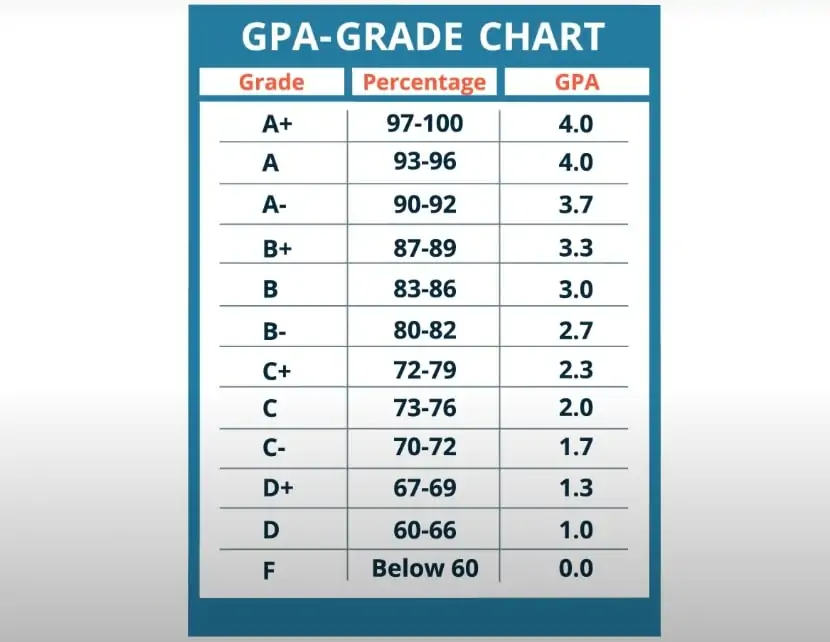
Share Post:
Your college GPA is more than just a number; it’s a reflection of how well you navigate academic challenges. Therefore, knowing what is a good college GPA is essential for all students.
Whether you’re aiming for graduate school, scholarships, or landing your first job, understanding what is a good GPA is crucial for future success.
In general, a GPA of 3.0 or higher is considered good, but a score above 3.5 can open doors to more competitive opportunities.
This article explores what makes a GPA “good” and how it can impact your academic and professional journey.
Key Takeaways
- A GPA of 3.0 or higher is generally considered good, with a 3.5 or above being particularly strong for those aiming for competitive graduate programs or job opportunities.
- Maintaining a good score requires consistent effort, effective study habits, and using available resources, which can significantly impact your academic and professional future.
- Even if your score is low, recovery is possible through strategies like retaking courses, seeking academic support, and improving study habits, helping you get back on track and achieve your goals.
What is a GPA?

Grade Point Average is a standard way of measuring academic achievement in the U.S. It’s a numerical representation of your overall academic performance, calculated by averaging the grades you earn in your classes. The most common scale used in colleges is a 4.0 scale, where:
- A = 4.0 (90-100%)
- B = 3.0 (80-89%)
- C = 2.0 (70-79%)
- D = 1.0 (60-69%)
- F = 0.0 (below 60%)
Types of GPA
- Semester: This is the average of your grades for a single semester. It provides a snapshot of how well you performed during that specific period.
- Cumulative: This is the average of all your grades from the time you started college until the current date. It’s a broader measure of your academic performance over time.
Importance of GPA

It serves several critical functions:
- Academic Standing: Most colleges require students to maintain a minimum score, often 2.0, to remain in good academic standing. Falling below this can lead to academic probation or even dismissal.
- Graduation Requirements: Many programs require a certain score to graduate, sometimes as high as 3.0 for specific majors or honors programs.
- Graduate School Admissions: Graduate programs often use this score as a key factor in admissions decisions. A GPA of 3.0 or higher is typically needed, though competitive programs may require 3.5 or higher.
- Scholarships and Financial Aid: Maintaining a good score is often necessary to qualify for scholarships and financial aid. Some scholarships require a minimum GPA of 3.0 or higher.
- Job Market: Some employers, especially in competitive fields, look at it as a measure of a candidate’s work ethic and ability to handle challenges.
According to data from the National Center for Education Statistics (NCES), the average GPA in U.S. colleges has steadily increased over the years due to grade inflation. As of recent studies, the average college GPA is around 3.1.
Why Does GPA Matter in College?
Your GPA is more than just a measure of your academic performance. It has significant implications for various aspects of your college experience and future opportunities.
Academic Standing
Maintaining a certain score is crucial for staying in good academic standing at your college. Most institutions require a minimum GPA of 2.0 to avoid academic probation or even dismissal from the program. This threshold ensures that students are meeting the basic academic standards set by the institution.
Graduation Requirements

To graduate, many colleges have specific GPA requirements, particularly for certain majors or honors programs.
For example, some competitive programs in fields like engineering or business may require a score of 3.0 or higher. Failing to meet these requirements can delay graduation or limit access to certain advanced courses.
Graduate School Admissions

If you plan to continue your education after college, your GPA becomes a critical factor in the admissions process for graduate schools.
Most graduate programs expect a minimum GPA of 3.0, but more competitive programs, especially in fields like law, medicine, or business, often look for GPAs of 3.5 or higher.
Scholarships and Financial Aid
GPA is often a key criterion for scholarships and financial aid. Many merit-based scholarships require students to maintain a GPA of 3.0 or above to continue receiving funding. This makes it essential for students who rely on financial aid to keep their GPA at a level that meets these criteria.
Employment Opportunities

While not all employers emphasize GPA, it can be a significant factor for certain industries and entry-level positions.
A high GPA can indicate to potential employers that you are capable of managing your time effectively, meeting deadlines, and performing well under pressure.
This is particularly important in fields like consulting, finance, and technology, where companies often use GPA as a filter during the hiring process.
What is Considered a Good GPA?

Determining what constitutes a “good” GPA can depend on several factors, including your academic goals, the institution you attend, and the field of study. However, there are general benchmarks that can help you understand where your score stands.
General Benchmarks
- 3.0 to 3.5: A score in this range is typically considered good. It indicates consistent performance with mostly B grades or higher. This range is often the minimum required for many scholarships, financial aid, and admission to less competitive graduate programs.
- 3.5 to 4.0: A score in this range is considered very good to excellent. It often qualifies students for honors such as cum laude, magna cum laude, or summa cum laude, depending on the specific GPA. This level of performance is highly competitive and can significantly enhance your chances of being admitted to prestigious graduate programs or landing desirable job positions.
- Below 3.0: While still respectable, a GPA below 3.0 can be limiting in certain scenarios. For example, it may not meet the minimum requirements for more competitive graduate programs or scholarships. However, it’s important to note that many factors contribute to success beyond GPA, and a lower GPA does not preclude future success.
Students in STEM fields (Science, Technology, Engineering, Mathematics) often have lower average GPAs compared to students in the humanities or social sciences due to the rigorous nature of STEM courses. This context is essential when evaluating what a “good” GPA means within your specific academic discipline.
Average GPA in Different Fields
| Major | Average GPA |
|---|---|
| Education | 3.50 |
| Biology | 3.36 |
| Engineering | 3.29 |
| Computer Science | 3.47 |
| Psychology | 3.32 |
| Business Administration | 3.24 |
| English | 3.30 |
| History | 3.20 |
| Nursing | 3.42 |
| Political Science | 3.31 |
How to Maintain a Good GPA
Maintaining a good score requires consistent effort and smart strategies throughout your college career.
Here are practical steps to help you keep your score in a desirable range:
Regular Class Attendance

One of the most straightforward ways to maintain a good GPA is by attending all your classes regularly. This ensures you don’t miss out on important lectures, discussions, or assignments that could impact your grades. Professors often cover material in class that may not be in the textbooks but will appear on exams.
Effective Study Habits
Developing effective study habits is crucial. Rather than cramming before exams, aim to study a little each day. Break your study sessions into manageable chunks, focusing on understanding the material rather than just memorizing it. Regular review sessions can help reinforce what you’ve learned, making it easier to recall during exams.
Time Management

Balancing your academic responsibilities with other aspects of college life is essential. Use planners or digital tools to keep track of assignment deadlines, exam dates, and other commitments. Prioritize your tasks based on their importance and deadlines, ensuring you allocate sufficient time for studying.
Utilize Campus Resources
Take advantage of the resources your college offers. Many institutions provide tutoring centers, writing labs, and study groups to help students succeed. If you’re struggling with a particular subject, don’t hesitate to seek help from these resources or directly from your professors during their office hours.
Participation and Engagement
Active participation in class can also contribute positively to your GPA. Engage in discussions, ask questions, and seek clarification on topics you find challenging.
This not only helps deepen your understanding but also demonstrates to your professors that you are invested in your learning, which can be beneficial when grading subjective assignments or participation marks.
Stay Organized

Keeping your notes, assignments, and study materials organized is key to maintaining a good GPA. Disorganization can lead to missed deadlines or incomplete assignments, both of which can negatively impact your grades. Use folders, binders, or digital tools to keep everything in order.
Manage Stress and Take Care of Your Health
Maintaining a good GPA isn’t just about studying hard; it’s also about taking care of yourself. High-stress levels can negatively affect your academic performance, so it’s important to find ways to manage stress, whether through exercise, meditation, or hobbies.
Last Words
While a low GPA can present challenges, it’s important to remember that it’s never too late to improve. By using the strategies outlined in this article, such as seeking academic support, retaking courses, and focusing on your strengths, you can recover and achieve the academic success you’re striving for.
Your GPA is just one aspect of your college experience, but it plays a significant role in shaping your future opportunities.
References:
- Accreditedschoolsonline.org – Academic Probation in College: What It Is and How to Get Back on Track
- Appily.com – What are Merit Based Scholarships & Merit Aid?
- Naceweb.org – Use of GPA as Candidate Selection Tool Falls
- Latrobe.edu.au – 8 reasons why attending classes will get you a better grade
- Sunsama.com – Digital vs Physical Planner: Which one should you use?
- Edutopia.org – How to Engage More Students in Classroom Discussions
- Academia.edu – THE IMPACT OF STRESS ON ACADEMIC PERFORMANCE
- Bestcolleges.com – Average College GPA: Full Statistics
Related Posts:











